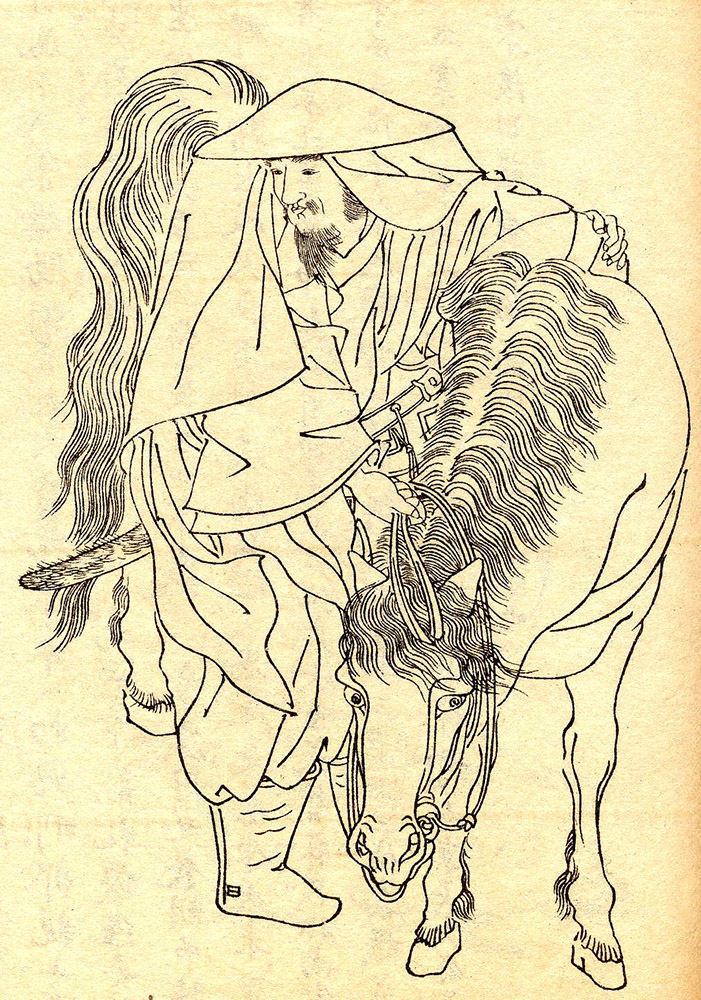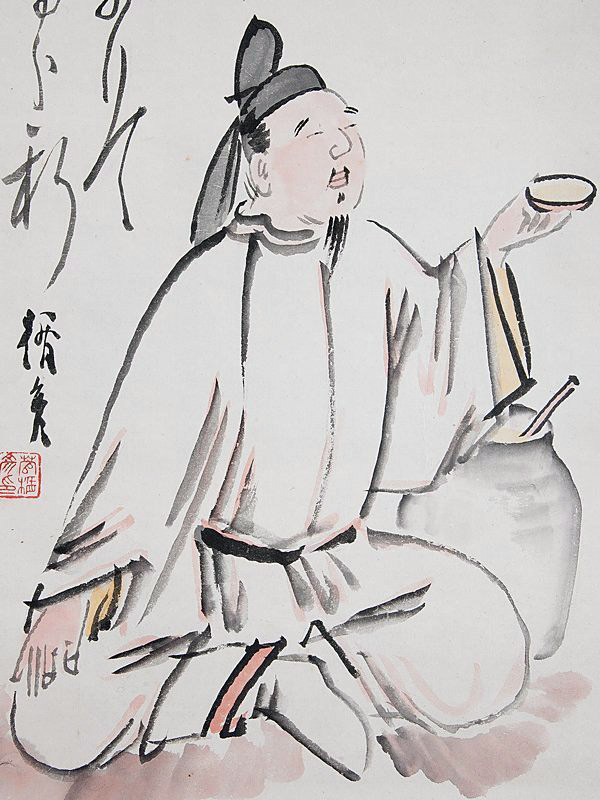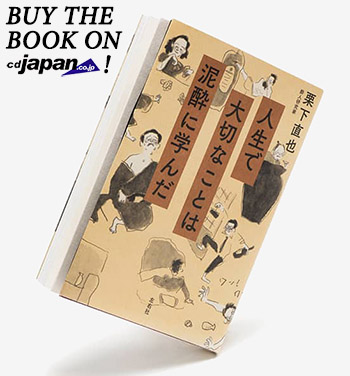Otomo no Tabito
If your coworker calls you a monkey because you don’t drink
Poet | 665 – 31 August 731
If you could choose any great historical figure to drink with, who would it be?
That was the question running through my mind as I was drinking last night. Honestly, as long as I got to drink, it wouldn’t matter who it was with—it could be an eminent figure or some total freak and it wouldn’t matter to me one way or another. But then that doesn’t really get the conversation going, does it now?
So, if I was to make a list of a few names, one person who would definitely be on the list is Otomo no Tabito.
“Oh, come on. Who the hell is that? Now you’re just being esoteric for the sake of it.” I can hear the complaints of all you snotnosed Heisei era folks. “How do you even read the kanji of his name?” Nevertheless, it was actually reported that the current era of Reiwa originally got its name from a waka poem by Tabito, suddenly making him the man of the hour. One never knows when it’s going to be their time to shine.
Surely you have seen his name in history textbooks. Playing a central role in military and other aspects of the Imperial Court, Tabito was the first child of Otomo no Yasumaro. He was born in 665, and he died in 731. As the head of his family, he rose in the ranks all the way up to Chief Councillor of State. However, he would end up leaving his mark on history not as a politician, but as a poet.
Past the age of sixty, before taking the post of Chief Councillor of State, Tabito was delegated to the city of Dazaifu in Kyushu.
Dazaifu was rather far away from the capital at the time. Today, it would probably feel similar to the distance between Japan and Nicaragua. While that may be a half-assed metaphor, when you consider how even Sugawara no Michizane—the person deified today as the “God of Learning”—would later be banished there, you can imagine that it was a place not everyone was delighted to go to.
There are two theories as to why Tabito was transferred there. Some say he was demoted, while others say it was for reasons of national defense. Either way, it was not an easy assignment for a man of old age. What’s more, soon after taking up this new post, his wife passed away. It’s a pretty sad story so far.
When bad things happen to people, they become become lyrical. They start wanting to write poems. Or so I say, but it’s not like I’ve ever written one myself. Anyhow, I think it makes people become poetic. Tabito’s collection Manyoshu contains over 60 poems, and he composed most of them while in Dazaifu. (By the way, Manyoshu is said to have been compiled by Otomo no Yakamochi, Tabito’s son.)
So now you know that he was a poet of the Nara period (710-794). But I can still hear some of you chastising me. “Aside from the whole Reiwa thing he’s just a total nobody!”
However, Tabito is known for having some wildly enthusiastic fans.
Poet Wakayama Bokusui, for instance, named his own son “Tabito,” and he left behind over 7,000 poems of which 200 are said to have been about alcohol. While “200” might seem like a rather large number of poems for someone to be writing about alcohol, as those of you who have looked into Bokusui’s private life will already know, it’s actually a shockingly small number.
Above all else, Bokusui drank. A lot.
It’s said that every day he would drink at minimum a one sho bottle (1.8 liters) of sake—two cups in the morning, two in the afternoon, and six in the evening. Others say that he was drinking more along the lines of three to four cups in the morning, four to five in the afternoon, and more than a full one sho bottle in the evening, making his daily sake average around 3.6 liters—and drinks enjoyed at banquets were counted separately.
If anything I’d be tempted to ask the guy, “Wait, you also write poems that aren’t about drinking?”
Once, while on a journey, Bokusui noticed that he had in the span of just one month drunk 235 liters—or 130 bottles—of sake, finally making him realize he was drinking too much. Normally, this is something one might perhaps realize a couple of bottles sooner.
Ultimately, Bokusui would continue to drink until his death at the age of 43. There is even an urban legend which says that when he died, the alcohol percentage of his body was so high that even though it was the hot month of September, his remains did not begin to smell for quite some time.
But Tabito has other fans, too.
Poet Tawara Machi, speaking about Tabito, says: “If I was to choose one historical person I would like to have a drink with, he would be my first pick.” (Asahi Shimbun, 2000/6/1 Evening Edition) In the opening I mentioned my “list” of possible candidates, but in Tawara’s case Tabito is literally her first choice. She loves the guy!
Tawara is best known for her poem: ““Hey, this tastes great!” you said, and so henceforth July the Sixth shall be our Salad Anniversary.” However, her original inspiration for writing the poem was actually not salad, but her experience when she seasoned her chicken karaage differently than usual and was complimented for the taste.
For us inebriates, karaage is of course synonymous with chu-hi. Accordingly, Tawara’s Salad Anniversary includes the following poem.
“Marry me,”
after two canned cocktails—
are you sure you want to say that?(Translation: Julie Winters Carpenter)
What attracts people to Tabito is his poetry about drinking.
In Manyoshu, he gave us thirteen poems in praise of sake. These poems have continued to capture the hearts of generation after drunken generation.
Instead of fretting
over things that can’t be changed,
how much better
to swallow down a full cup
of cloudy sake!(Translation: Steven D. Carter)
He’s saying it’s better to drink than to endlessly worry about things. Surely this is a sentiment that many people even today can appreciate.
However, it’s not yet extreme enough for a Tabito poem.
Rather than being
only a mere human,
if only I could
become a saké flask
and be soaked in saké.(Translation: Jeremy Robinson)
Rather than being a halfhearted human being, you might as well become a sake jar so you can just be completely soaked in the stuff. That seems to be the gist of it. A pretty shocking thing to say, but hey, at least it feels human.
These days, if you were to suddenly start talking about how you wanted to “become a sake jar,” you would just come across as a crazy person. But this line actually hints at Tabito’s more intellectual side and his interest in Chinese culture.
When Zheng Quan of the Wu dynasty was on his deathbed, he asked his son to bury him beside a kiln. Then, after several hundred years had passed and his remains would have turned to soil, he could be used as the raw material for earthenware, and were he then to be made into a bottle of liquor, his ultimate wish would thereby be fulfilled.
Tabito, learned as he was, utilized this historical event in his poem above.
What an ugly bunch—
those who in pretended wisdom
will not drink sake.
The closer you look at them,
the more they look like monkeys!(Translation: Steven D. Carter)
How unseemly. Individuals pretending to be virtuous people by not drinking, but then upon closer inspection, they’re like monkeys. It might sound like a pretty terrible thing to say, but this poem, too, shows strong influence of the Chinese classics.
These classic Chinese works include many stories of drinkers and non-drinkers trading insults. In Collection Nihon Kajinsen 41: Otomo no Tabito, Nakajima Shinya speculates on the circumstances behind this poem.
You sometimes hear non-drinkers saying things like, “Look at you, all red in the face drinking like that. You’re like a monkey.”
It’s possible he just wanted to use the same language. “You’re the damn monkey!”
Whether or not the above conjecture is accurate, it almost makes me want to take back my previous comments. Earlier, I was going on about how “intellectual” and “learned” Tabito was. But calling people monkeys… He sure does come across as a pretty bad drunk.
However, he was by no means trying to ridicule non-drinkers. Whether you drink or not, that’s your choice. He knew full well that some people cannot drink. Most likely, what he was trying to express was that just like how “our side” doesn’t say anything about people who don’t drink, we similarly don’t want to listen to you telling us—with that know-it-all look on your face—how hopeless we drinkers are.
What with the strong headwinds against drinkers these days, surely there are many of us who just want to be left alone if we’re not causing anyone any trouble. It’s not as if we’re causing injury like smokers do with secondhand smoke. There’s no need for us to feel timid.
So the next time you’re at a company drinking party and someone says something unreasonable to you, I want you to yell at them and call them a monkey. Sure, there’s a strong likelihood you’ll be met with verbal attacks followed by complete avoidance when you go to work the next day. But hey.
Jokes aside, surely many of you reading this would now also like to have a drink with Tabito. If you acted even a tiny bit pompous around him, you’d run the risk of him writing a poem about you with the implication of, “Go home, you damn monkey.” But that would just be part of the fun, wouldn’t it?
That reminds me…
Yamanoue no Okura, noted Manyo poet and friend of Tabito’s, also left behind a poem of great interest.
I, Okura, take my leave,
for my child
must be bawling,
and his mother
is surely waiting for me.(Translation: Peter MacMillan)
“I’ve gotta go. The kids are crying and the wife’s waiting.”
This one is said to have been recited by Okura as he announced he was leaving a party that was in full swing. This one poem shows us how not everyone back then was a hopeless drunk who would not go home before he was completely and utterly faded.
However, don’t go thinking that this guy was out there winning any World’s Best Dad Awards either.
It’s possible that Okura was over 70 years old when he composed this poem, and it’s only sensible to assume that at that age he probably didn’t have an infant at home eagerly awaiting his return. Instead, many have suggested that as he excused himself and someone tried to stop him from leaving, he sang this poem to them as a joke.
No matter how they might always try to stop you from leaving the party, if you just keep repeating how “the missus” is waiting for you back home, they’ll usually let you off the hook with a laugh and without resistance. Here, Okura was employing that very technique.
Another interpretation is that the poem was a representation of the psychology of all the young officials present at the party. One can surmise that just as some of us really love drinking parties, there have always been a certain fraction of people who have absolutely loathed them since ancient times.
Nonetheless, if you don’t want to attend a drinking party, or if you suddenly want to leave one midway, giving them a poor excuse could lead to them holding a lasting grudge against you. Because throughout the ages, there have and there always will be those idiot bosses who are going to think less of you as they’re muttering, “Sheesh, that guy… What a killjoy.”
Therefore, for times like that, it’s best to take a page from Okura’s playbook. Remember: you should always be equipped with a good comeback.




